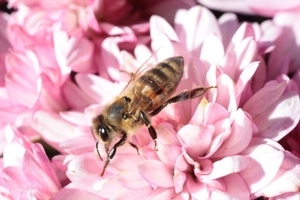- 01843 834160
- [email protected]
- Mon - Fri: 9:00 - 17:00
Pollinator action plan to improve the lives of bees in Kent

A pollinator action plan to improve the lives of bees in Kent is due to be adopted by the county council this week.
It is designed to put Kent County Council at the heart of action for pollinators and, with others, improve the habitat and the food sources of these insects to reverse their decline.
Pollinators not only include bees but wasps, butterflies, moths, hoverflies, ants and other insects.
KCC cabinet member for the environment Mike Whiting said: “Pollinators are vital to our food, economy and environment and this action plan sets out what we want to do.
“We want to be a community leader in taking action, showing the way for others in what we do, ensuring their needs are always considered throughout our work and services.
“The conservation of pollinators and their habitats, such as our roadside verges and parks, will be at the heart of the council’s land management and planning.
“We also want to encourage the people of Kent to take their own action, however big or small, in their communities, workplaces, schools and homes.
“We want to aid the recovery of pollinator populations and support biodiversity and we will work with planning authorities for future developments to benefit pollinators and their habitats and food sources.”
The plan comes during Bees’ Needs Week, a weeklong campaign by the Bumblebee Conservation Trust to help raise awareness of bees and other pollinators.
In May 2018, Cllr Martin Whybrow, seconded by Cllr Sean Holden, tabled a motion at Full Council calling for the establishment of a cross-party working group to produce a Pollinator Action Plan.
Over the last 12 months a draft action plan has been developed and in May the Environment and Transport Cabinet Committee recommended that Cllr Whiting approve the draft plan and take it to Full Council for adoption.
Pollinators are essential to the environment and to people’s lives, and they are declining fast.
A third of the food we eat depends on them.
Kent is an important county for bees. Six of the seven rarest species of bumblebee live here. Most, like the shrill carder bee, are now found only in coastal areas.
The plan has three main objectives:
• to manage council land owned or controlled in a way which can benefit pollinators’ forage and habitat.
• to use the planning system to protect pollinators and improve the habitats on which they rely.
• to encourage the people of Kent to take action themselves.
The plan will be discussed at County Council on Thursday.
You are able to keep up to date with our articles, news and publications by following us on our social media channels below:












